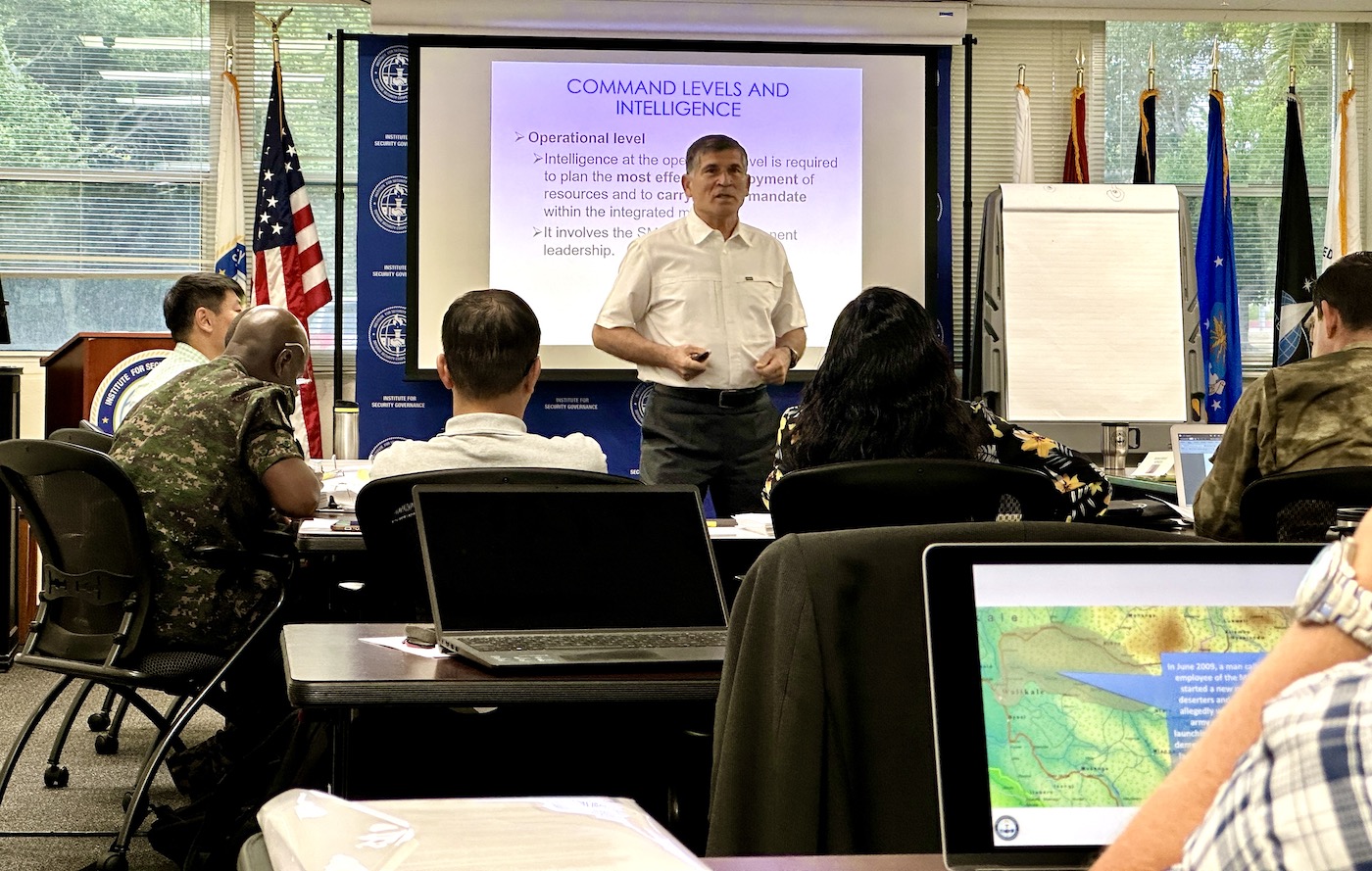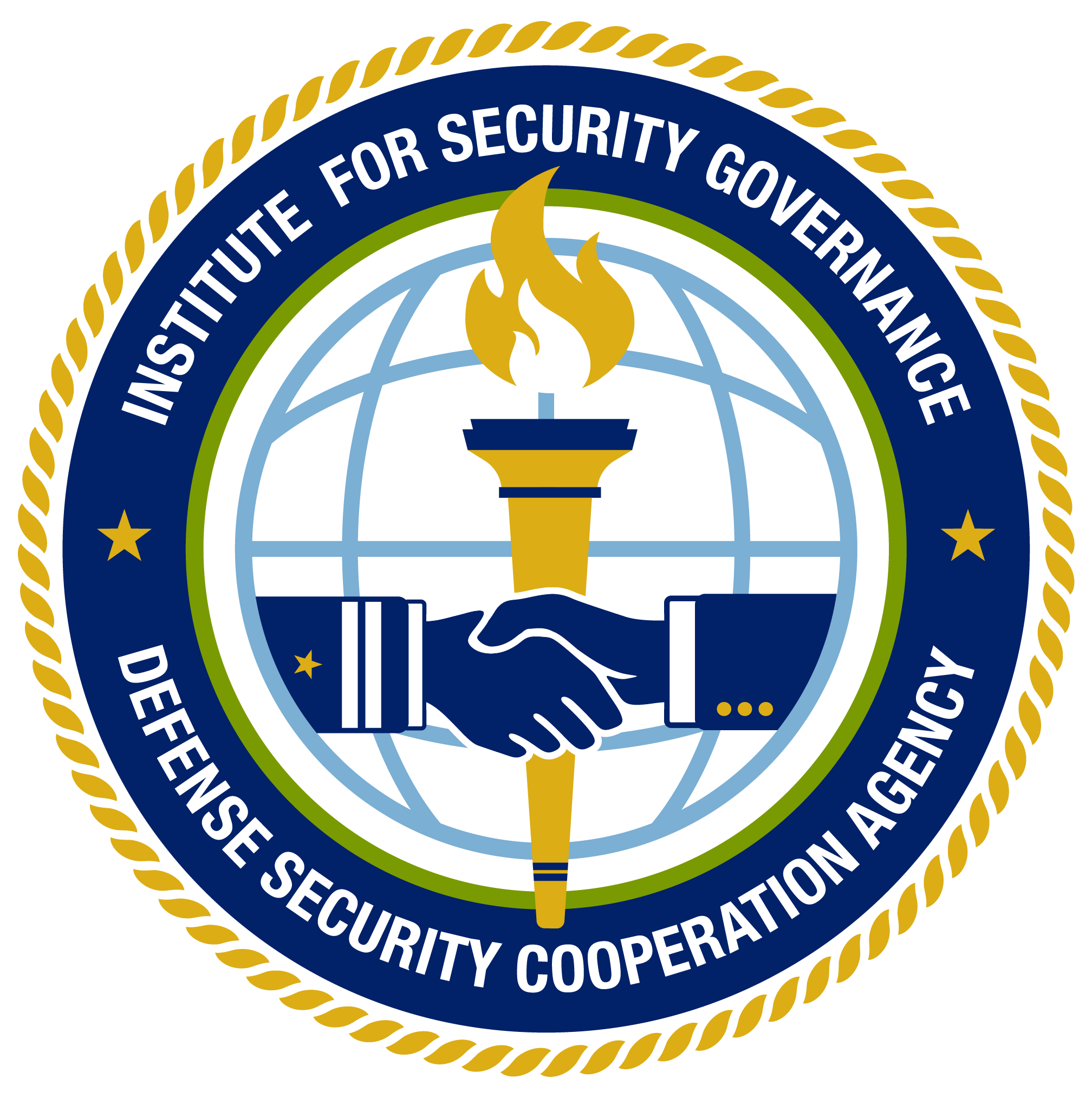UN PEACEKEEPING OPERATIONS CONTINGENT COMMANDERS COURSE - Defense Security Cooperation University

Aug 21, 2023
UN PEACEKEEPING OPERATIONS CONTINGENT COMMANDERS COURSE
By Jenny Leggett
After ten years of being conducted abroad solely as a mobile course, the United Nations (UN) Peacekeeping Operations Contingent Commanders Course (PKOCC) was once again delivered at DSCU’s Institute for Security Governance (ISG) schoolhouse in Monterey, California. ISG’s Peacekeeping and Exercises (PKX) functional team successfully conducted the two-week resident education course for 11 high-ranking participants from Bangladesh, Cameroon, The Gambia, Liberia, Mongolia, Peru, Senegal and Zambia. The UN PKOCC is a MAJ-COL level leadership course specifically geared towards discussing in detail the real-world challenges that participants face as the commanders of national contingents in ongoing UN Peacekeeping Operations.
ISG's PKX program, led by Mr. Lance Sells, is responsible for the Institute’s activities in support of Geographic Commands in building peacekeeping capacity within Global Peace Operations Initiative (GPOI) partner nations and enhancing multi-national peacekeeping efforts. In describing how ISG’s PKX program dovetails with greater international initiatives, like GPOI, Mr. Sells said,
“The goal of ISG’s PKX program is to enable partner nation peacekeeping training centers to become fully training capable and as self-sufficient as possible. Our primary program goals are to continue to improve ties with the UN’s Integrated Training Service and to increase our activities with key partners in the peacekeeping community.”
PKX program objectives strive to not only enable training centers to receive current UN Integrated Training Service training recognition in specific courses, but also be able to self-sustain future training requirements to meet national pledges to worldwide peace operations. With that in mind, PKX courses are designed to provide up-to-date materials and training methodologies, compliant with UN training requirements that incorporate the latest lessons and best practices from ongoing missions, as well as provide unrivaled career UN expert instructor/mentor support.
One such expert featured during the latest iteration of the course was Lieutenant General (Retired) Carlos Alberto dos Santos Cruz, the central author of Improving Security of United Nations Peacekeepers, otherwise known as the 2017 “Santos Cruz Report.” General Santos Cruz is a distinguished Brazilian military officer who served as a senior commander in the United Nations Peacekeeping Missions. The report addressed the pressing issue of threats to peacekeepers fatalities in conflict zones and highlighted the need for stronger measures to enhance the safety and UN personnel. General Santos Cruz's insightful recommendations led to substantial improvements in peacekeeping operations, including the development of better training protocols, the adoption of more robust risk assessment procedures, and the implementation of enhanced force protection measures. His unwavering commitment to safeguarding the lives of peacekeepers continues to shape and strengthen UN peacekeeping missions worldwide.
Throughout the resident course, General Santos Cruz provided informative and illustrative vignettes from his extensive career and was able to engage in thoughtful dialogue and collaboration with course participants that no doubt proved enlightening and encouraging. His emphasis on peacekeeping efforts that invest in long-term, transparent relationships in local communities and peacekeeping operations mirrors recent shifts in the UN peacekeeping approach. It is a hallmark of ISG courses to include renowned experts from the field to amplify its learning agenda and to enhance the participants’ experience.
Through courses like the PKOCC and in-country training exercises, the PKX program has been highly effective in enhancing the training capabilities of top UN Peacekeeping contributors and advising countries engaged in expanding their peacekeeping capabilities.
About this course: The PKOCC course prepares participants to take on roles and responsibilities of contingent, battalion, and sector commanders in complex peacekeeping operations (PKO) for the United Nations (UN) and other multinational organizations.
Upon completion of this course, participants are able to:
- Understand the operational environments of today’s conflicts and commanders’ roles in integrated missions
- Understand the importance of consensus, coordination, and communication among all actors at the operational level
- Have an awareness and understanding of the various components of peacekeeping operations (PKO)
- Understand the underpinning legal framework of United Nations Peacekeeping Operations (UNPKO) and the attendant integrated assessment and planning
- Understand the responsibilities and roles of effective commander leadership of peacekeeping operations (PKO) personnel
- Apply basic principles of negotiation and mediation
Course topics may include United Nations Peacekeeping Operations (UNPKO) and the integrated mission planning process; human rights and gender; conflict management; negotiations and mediation; the United Nations (UN) system, various field agencies, and operational coordination among them.
Learn more here about the Peacekeeping and Exercises courses offered and how ISG is working to help partner nations identify, assess, and plan for robust and effective peacekeeping operations.

